As we approach International Women’s Day on March 8, I would like to share a few observations regarding gender and health made over the past three decades of teaching posture.
Does gender affect back pain?
Back pain and the posture distortions behind it are very democratic—people of all ages, activity levels, geographic locations, and gender are affected by cultural postural distortions. That said, some modern posture guidelines and expectations are gender-specific, and some of them affect women disproportionately. We will discuss posture guidelines for men another time. In this post, I’d like to address some of the messaging that is relentlessly addressed towards women and girls, and the consequences of this messaging.

In our society back pain affects people across all social groups. Different groups can be affected disproportionately in particular ways. Image from Pexels
Fashion and posture
I think it’s fair to say that women are more subject to fashion and to its extremes than men.
Conformity to fashion, and rebellion against it, has women, more than men, stuck with uncomfortable, biomechanically unhealthy, and impractical garb. Examples are:
- High heels that deform the feet and prevent mobility
- Tight clothes that distort body alignment and restrict range of motion
- Eating lightly to be thin and retain teenage proportions
- Encouraging women and men to unduly judge women by their appearance
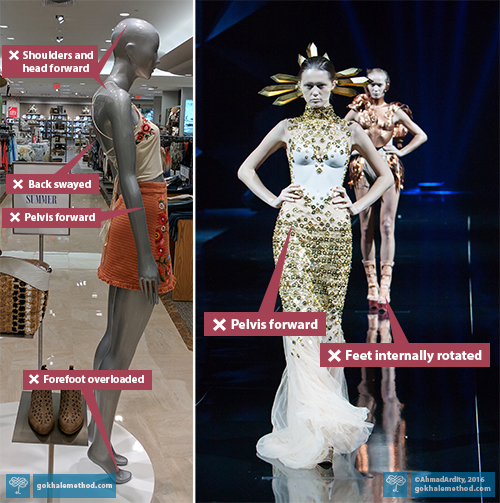
Most fashion role models for women encourage an emaciated, weak physique, a tucked or forward pelvis, internally rotated legs, and forward shoulders and head. Images from X, Pixabay
One of the most damaging distortions perpetuated by the fashion industry is tucking the pelvis. This pose exploded onto the scene in the 1920s, and has been a look ever since. Perhaps a reaction against corseting and “stiff” pre–World War 1 fashions, it encouraged a relaxed but slouched posture, with a tucked tail, rounded shoulders, and forward head.
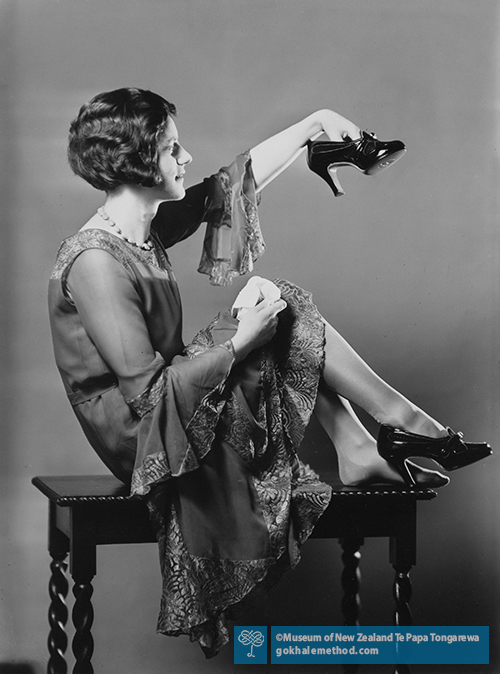
This 1920s portrait shows the new “relaxed” posture which translates as tucking the pelvis, rounding the back, and jutting the head forward. (Photo of Eileen McCahon, New Zealand). Image from Unsplash
While tucking the pelvis is a problem for everybody vis-à-vis spinal health, when it comes to pelvic organ health, women have much more to lose! In addition to the rectum, which is at risk of prolapse in all genders, women are additionally at risk for a prolapsed uterus, vagina, and bladder, as well as urinary incontinence. Women also have a more vulnerable pelvic floor due to the stresses of pregnancy and childbearing. The wider female pelvis is also at higher risk of instability, with this effect amplified by the pregnancy hormone relaxin.
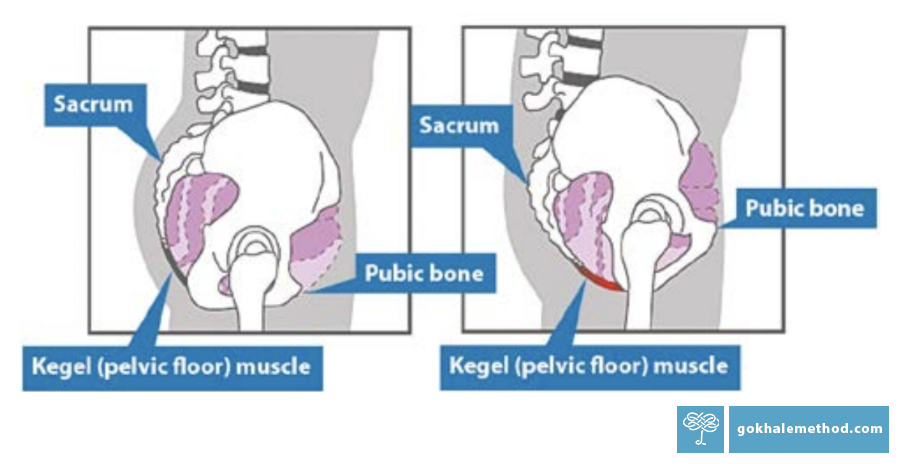
An anteverted pelvis (left) gives optimal support to internal pelvic organs and the connective tissues that hold them in place. A tucked pelvis (right) makes us more vulnerable to organ prolapse.
Pregnancy and the nursing of babies can bring with it yet more musculoskeletal challenges. The extra weight requires additional strength and resilience throughout the body. For example, weak abdominal muscles cause the spine to be pulled into a compressive sway, dangerously loading the spinal discs and nerves. While nursing and caring for an infant, it takes a strong inner corset and posture wisdom to lift, hold, and carry an infant well, or these actions too can cause significant damage.
Several of our teachers, including myself, came to the Gokhale Method for solutions to pregnancy-related trials. These past blog posts reflect some of our experiences: Esther Gokhale and Julie Johnson, Esther Gokhale and MommaStrong, Esther Pohl, Janine Farzin.
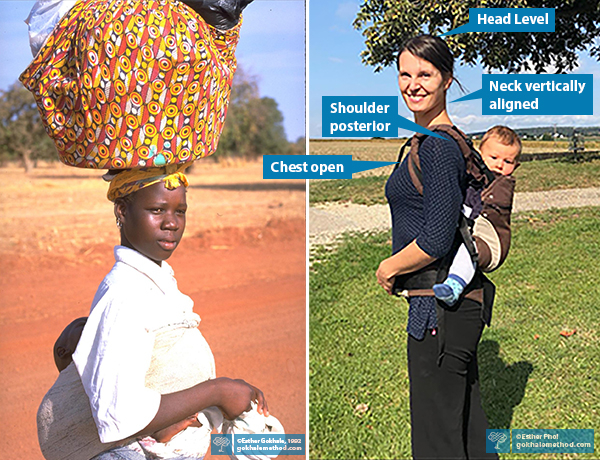
This young mother in Burkina Faso (left) is using her inner corset to remain tall, stable, and relaxed while carrying on her head with her baby on her back . Gokhale Method teacher Esther Pohl (right) found that traditional posture principles really work, and carried her second child much more comfortably.
Outside of the physiological and anatomical considerations mentioned above, in my experience women are also disproportionately raised to be “good girls” and people-pleasing, and to conform to current social norms. Postural examples would be:
- Craning the neck forward to signal empathy and attentiveness
- Turning the legs inward to be “modest”, which forces the pelvis to tuck, cultivates internal rotation of the legs and feet, and compromises circulation to the lower body
- Sitting and standing in ways that diminish size and surrender space, such as rounding the shoulders and stooping.

Body language and fashion norms for women often result in posture that diminishes their size, space, and sometimes, self-confidence. Image from Pixabay
Unless we have been subject to protection from poor posture by exposure to a strong and healthy postural tradition, we are likely to have acquired at least some of these disabling habits. When women set out on a journey into healthy posture it often awakens indignation as they gain awareness of the reasons for some of their aches and pains. This reaction can act as a useful spur to positive action. A healthy strategy going forward is about repairing the situation—and celebrating being an active woman enjoying a pain-free body.
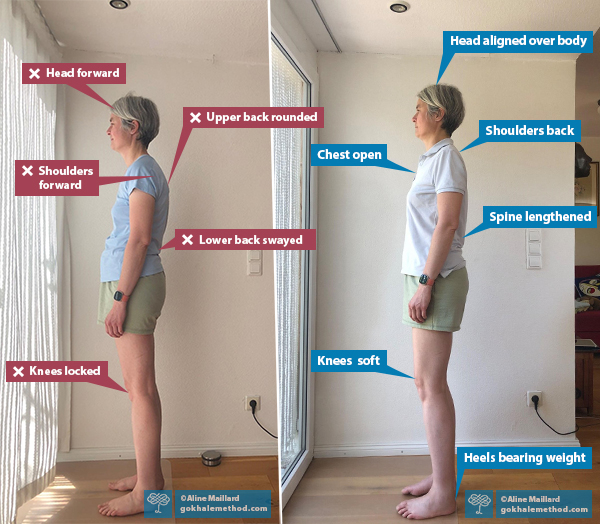
Aline was able to start making many empowering posture changes during her weekend Gokhale Foundations Course, and continues her journey of discovery.
On March 12, 12 p.m. PST, my colleague Julie Johnson and I will be offering a special free online workshop called Women’s Empowerment Through Posture. Join us to discuss the issues raised by our many thousands of female students over the years—some of them mentioned here, and many more besides.
We are excited that this workshop is the kick-off for a brand new Women’s Empowerment Through Posture campaign. For those joining our free online workshop live we will also have a special offer and will be unveiling a brand new offering!
Best next action steps
If you are new to the Gokhale Method, get started by booking a consultation, online, or in person with one of our teachers.
You can sign up below to join any one of our upcoming FREE Online Workshops…



Comments
Sitting posture is very
Sitting posture is very important for women. So always sit up straight in everything, including doing housework, taking care of children, playing game tunnel rush or any other work.